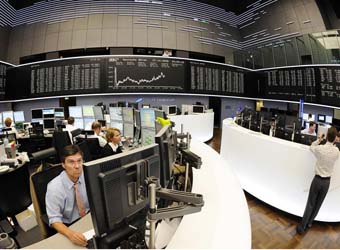The Nikkei 225 rose 0.84 percent to snap a six-day losing streak as financials, retailers and most tech names rose. Fast Retailing added 1.31 percent, Nintendo gained 3.2 percent and SoftBank advanced 1.47 percent. Energy-related plays traded mixed.
South Korea’s benchmark Kospi index tacked on 0.46 percent. Blue-chip tech names and manufacturing stocks were mostly higher, with Samsung Electronics advancing 0.87 percent. Energy-related stocks also climbed as refinery company S-Oil rose 1.28 percent.
Down Under, the S&P/ASX 200 edged up 0.15 percent as the heavily-weighted banking sub-index stood little changed in the morning. The energy sub-index climbed 1.77 percent after taking a beating earlier in the week following the declines in oil prices.
The positive sentiment was also mirrored in greater China markets. The Hang Seng Index rose 0.53 percent. On the mainland, the Shanghai Composite reversed early gains to slip 0.1 percent and the Shenzhen Composite rose 0.2 percent.
Stateside, equities finished the Wednesday session lower as declines in oil prices weighed on energy-related stocks. Investors also focused on the likelihood of proposed tax reforms getting passed before year-end.
The Dow Jones industrial average lost 138.19 points, or 0.59 percent, to close at 23,271.28 — its lowest finish in more than three weeks. Oil prices inched higher after declining on Wednesday when a U.S. government agency report showed the build in crude stockpiles was larger than estimated.
Oil prices inched higher after declining on Wednesday when a U.S. government agency report showed the build in crude stockpiles was larger than estimated.
U.S. West Texas Intermediate rose 0.05 percent to trade at $55.36 per barrel and Brent crude futures traded 0.19 percent higher at $61.99.
Stateside, the closely-watched consumer price index rose by just 0.1 percent in October compared to the 0.5 percent rise seen in September, which was in line with a forecast from economists in a Reuters poll.
Other U.S. data released on Wednesday included retail sales, which edged up 0.2 percent in October. That was above a Reuters poll in which economists had expected the metric to be unchanged, but still softer than the 1.9 percent rise in September.
Following those releases, the dollar was little changed against a basket of currencies at 93.900 at 12:12 p.m. HK/SIN after trading as low as the 93.4 handle on Wednesday. The greenback, meanwhile, was firmer against the Japanese currency, with the dollar last trading at 113.02 yen.
Investors also kept an eye on the U.S. Treasury yield curve, which was at its flattest in 10 years as markets anticipated a December interest rate hike from the Federal Reserve.
Fairfax’s real estate classifieds unit, Domain, began to trade on the Australian Securities Exchange on Thursday under the “DHG” ticker. The unit had been spun off from Fairfax after shareholders voted for the move earlier this month. Fairfax shares rose 8.04 percent after tumbling more than 30 percent in early trade.
Shares of Santos popped, rising 12.56 percent after the company said it had rejected a takeover bid from Harbour Energy in August and had not received a current proposal. The company’s announcement came after the Australian Financial Review reported earlier in the day that the oil and gas company was the target of a proposed 11 billion Australian dollar ($8.34 billion) takeover.
Elsewhere, Yixin Group, a Tencent-backed online platform for car sales, made its debut in Hong Kong on Thursday. Shares were priced at HK$7.70 ($0.98) apiece — the top end of the price range — and the IPO is expected to raise around HK$6.5 billion ($833 million), the company said in a filing. Yixin shares were last up 8 percent after spiking some 30 percent at their open.
Meanwhile, Tencent reported net profit rose 69 percent to 18 billion yuan ($2.72 billion) for the quarter that ended in September, easily beating the average 15.18 billion yuan forecast by analysts in a Thomson Reuters poll. The Chinese internet company said its revenue increased 61 percent to 65.2 billion yuan. Tencent shares rose 2.25 percent following the beat in earnings.
The Australian dollar got a boost after a Thursday data release showed employment increased for the 13th consecutive month in October. The currency traded at $0.7593 at 12:11 p.m. HK/SIN after touching as high as $0.7609 earlier in the session. The Aussie dollar had fallen during Asian trade in the last session following the release of weak wage data.
